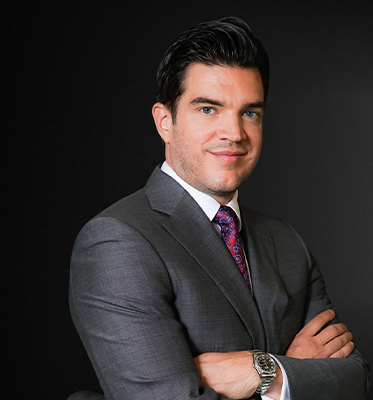Entrepreneurial catalysts: a vision for change
By Jonathan Merineau-Gosselin - Posted on 25 March 2021
MBA alumnus Jonathan Mérineau-Gosselin is co-founder of a company that plans to build the largest indoor farm in the world – and to be a global exemplar for food production. Read on to find out more.
Food security is a huge issue in the UAE and GCC area – the UAE imports around 90% of its food. We have seen with Covid that when something disrupts supply chains, it can be difficult to supply citizens with food.
The UAE Strategic Vision is that by 2051 the UAE wants to be self-sufficient for food production and to be an exemplar of growing food in arid areas globally.
As co-founder of rainMKRS Capital, we are planning to build the largest indoor farm in the world right here in the UAE. Our vision is to push these plans forward by acting as entrepreneurial catalysts to develop food producing infrastructures in the UAE focussed on building the number of crops, livestock, and aquaponics farms and systems in support of the national food security strategy. The plan is to deliver these in the most technologically advanced manner while focussing on environmental sustainability, business continuity and transfer of knowledge to ensure continuity of this new economic sector that is critical to the country’s future and to the global population. In achieving the latter, rainMKRS will humbly contribute to making the UAE the leading country in the world as it will establish itself as the Global Agri-Hub for agricultural technologies and know how to grow food in arid climates to maintain sufficient levels of food for a growing population and scarcity of arable land globally.
It’s ambitious but we want to do something that leaves our mark on the world, to leave a legacy behind: many say this but we really do have the means and will to deliver on this promise. We are all fathers and family men and there is more to this project than profitability, it’s about making the world a better place, it is about building a better future for our heirs.
Originally from Montreal, I always was an entrepreneurial person, working in real estate and hospitality ventures before moving to the UAE in 2013. My first assignment in Abu Dhabi was to look after a real estate and master planning for one of the Government Master Developers and that’s when I started doing my MBA at Strathclyde's UAE centre. Following the completion of my MBA, we started crafting the vision of what would become rainMKRS Capital. One of our associates and co-founder of the project, Mohamed Jouan Al-Dhaheri, had asked me in the course of developing our venture to help him out managing his family office. I therefore took the lead as the Managing Director (MD) of Monarch Group. My work with Monarch has been focussed on digital transformation and future proofing the organisation for the years to come. The company activities predominantly focussed around a large portfolio of real estate valued over 1 billion USD.
Our ambitious vision has been developed by reverse engineering the UAE’s agenda and strategic vision as well as uncovering the market gaps that would allow us to create impact. Together with Mohamed Jouan Al Dhaheri, Sultan Al-Nassour, Mario LeBlond and Sebastien Leblond, a corporate lawyer from Canada, we have formed rainMKRS Capital. We basically saw a gap in the market for being an ‘entrepreneurial catalyst’ - that’s the concept we use to define what we do – and food security seemed to be a hugely important area for the UAE Government so that was the area we decided to focus on.
The Dutch Embassy got in touch with us a year ago and this led to us making a partnership with a Dutch ecosystem - to progress our vision for food security for the UAE. It’s difficult to grow things, particularly in the desert, but indoor farms are a way to grow food in arid climates. The Dutch expertise brings the operational day-to-day knowledge of running the farm to the project and we bring our entrepreneurial expertise and knowledge of the UAE and how it works to push this venture forward.
Traditionally, the UAE mainly had camel and date farms with a commercial approach and vegetables were grown with a subsistence approach - this project is taking farming in a different direction to the traditional. This whole arrangement is new and we want to make it sustainable and have benefits for the local area, not just in terms of food security. For example, we want to introduce vocational training and education round the operation of the farms so the young people here engage with this new industry and we have ongoing sustainable local expertise about this type of farming.
Once we announced our partnership with the Dutch, the Canadian Government contacted us and is keen to start work on similar projects – in their case, to grow produce during the winter. There are issues with these farms in terms of not wasting too much water and energy but there are new technologies which can help and keep it all eco. We want to support a virtuous eco-system round this type of farming in terms of fertiliser and water too. We plan to try new technologies and create a platform for innovation in smaller farms in the EU. We are at the moment using proven technologies to get the project up and running but once we are at the point of producing food here in the UAE, we can test out new and innovative ideas – that is when Research and Development will come into its own and where we can try new solutions for producing food at scale.
Construction on the UAE’s first indoor farm is to start in the next few months and we plan to deliver the first phase in 15 months. This is a very ‘on point’ project and we are early movers on it. Climate change could make it difficult to grow traditional produce in many places across the planet and what we learn from doing this can then be rolled out to countries struggling with food production in other areas, perhaps helping to solve crop failure through drought or floods.
We hope our role as entrepreneurial catalysts kick starts a new way of working which, in terms of food security, will have benefits for humanity worldwide.










